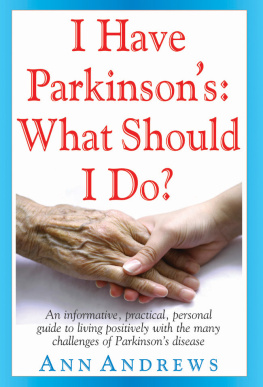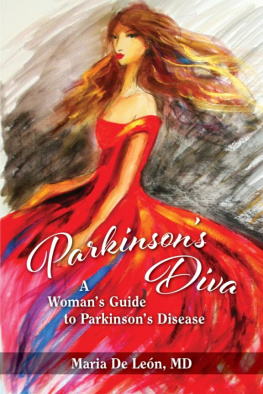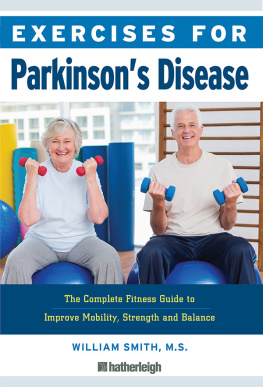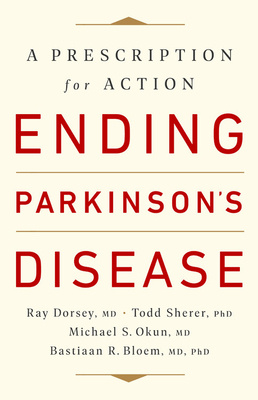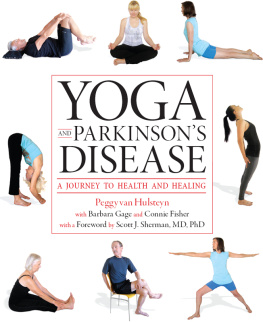
ADVICE FROM A PARKINSON'S WIFE
20 LESSONS LEARNED THE HARD WAY
BARBARA SHEKLIN DAVIS

CONTENTS
Also by Barbara Sheklin Davis
Copyright 2019 by Barbara Sheklin Davis
ISBN: 978-1-950349-12-8
Parker Hayden Media
5740 N. Carefree Circle, Suite 120-1
Colorado Springs, CO 80917
All Rights Reserved. No part of this book may be reproduced or transmitted in any form or by any means, electronic or mechanical, including photocopy, recording or by any information storage and retrieval system, without permission, in writing from the publisher.
Cover credits:
Cover design: LB Hayden
Graphic: allegrio/DepositPhotos
Dedicated to my husband, Leslie, who was my teacher.
INTRODUCTION
Living with an incurable disease like Parkinsons is very different from living with a terminal illness. This is a disease youre going to live with for a very long time. You really have to make peace with it.
Connie Carpenter-Phinney, Deseret News, "Olympic cyclist shares his secrets to 'living well' with Parkinson's"
There are more than ten million people worldwide living with Parkinsons disease. Men are 1.5 times more likely to have Parkinsons than women. In married couples, a wife is thus statistically more likely than a husband to be a caregiver. Such is the case for me. I am seventy-five years old and my husband is seventy-seven. He has had Parkinsons for over twenty years.
I love my husband. In writing this book, I have no wish to hurt or embarrass him. He did not want to get Parkinsons and he is not happy that he has it. There is no doubt that the burden of the person with Parkinsons is far greater than that of the caregiver. But the caregiver experience is not an easy one, particularly if the caregiver is a wife. Some have even suggested that the stronger the marital bond, the more difficult the challenge. My husband and I have been married for over fifty-five years. We have three wonderful children and nine delightful grandchildren. We both had fulfilling careers and enjoyed life. Parkinson's changed all that, not all at once, but gradually and inexorably.
Becoming a Parkinsons caregiver was uncharted territory for me. I am not particularly suited to the role by temperament, and certainly not by training. I remember telling a friend, whose husband had had the disease and recently passed away, that my husband also had it. She embraced me sorrowfully and said, Oh, my dear. What a journey you are about to undertake. She was correct. Parkinsons is a journey with few signposts and few guides. Because the disease affects people so differently, because treatments that help one person are ineffective with another, because people are so different, it is very hard to generalize about Parkinsons.
But one thing I noticed is that Parkinsons spouses are not given much attention. Clearly the focus in the medical community must be on the patient; clearly the expectation in the larger community is that a wife will be there for her husband in sickness and in health, and vice versa. Thus, a Parkinsons spouse is somehow expected to know what to do, expected to bear the burdens without complaint, expected to be strong and capable and loving. But the Parkinsons journey is filled with the unexpected, and, in writing this book, I am hoping to provide others with some of the information and guideposts I wish had been available to me.
We live in an age in which transparency and authenticity are valued, and I think it is vitally important that people dealing with Parkinsons have as much knowledge and understanding as possible, in order to be intelligent about asking questions and making decisions, and realistic about meeting the challenges.
There are dozens of books that provide information about Parkinson's. In the age of social media and search engines, there are also many websites, podcasts, chat groups, and blogs about Parkinsons. But all of these, understandably, focus on the positive, on things that can be done successfully, on ways to manage, reasons to be optimistic, hopeful directions for the future. The result, however, is that many of the more serious and yes, depressing, issues tend to be glossed over. The really tough matters are discussed in scientific and medical journals, in a style and language that are inaccessible to the average person with Parkinson's or his or her care partner. Finding and reading these sources is a daunting task, and not really helpful to the layperson.
But caretakers need to know; they need to be prepared; they need to be informed. Most people are acquainted with the concept of caretaker burnout and caution caregivers to take steps to avoid it, but that does not take into consideration the fact that ones spouse is not going to die from Parkinsons, but with it, and the disease will be a part of ones marriage til death do you part. The Parkinsons spouse has to be knowledgeable. There was not a lot of information available to me when I began this journey two decades ago. Much more is available now, and the focus of these resources is on facts and understanding, as it should be.
This book, however, is different. It chronicles the serious matters that most Parkinson's spouses dont talk about publicly, the feelings and frustrations they are often ashamed to share. I hope that by speaking out, by revealing some of these issues to others, I can help them in ways that were not available to me, and let them know that they are not alone in dealing with the more negative impacts that Parkinson's will have on their lives.
It is well known that the spouses of patients with chronic or acute illnesses experience high levels of stress as a result of fear, uncertainty about the future, and the dramatic revisions they must make in their daily existence and in their long- and short-term life plans. But I found that one of the most agonizing aspects of being a Parkinsons wife was the feeling that I had no idea what I was doing and that no one could help me. For years, each time a new problem or symptom arose that seemed related to Parkinsons, I questioned the doctors and researched the internet, only to get no answers.
I struggled through alone, and it was only after having done so for a number of years that I began to find information online that validated my experiences and sometimes even provided helpful suggestions. Solutions dont always exist, but some comfort can be obtained through confirmation of your experiences and the knowledge that you are neither alone nor making this up. This is particularly true with regard to the mental issues that Parkinsons causes, which are not as visible as the physical symptoms.
Family caregiving is still primarily gender-based. Women are the major providers of long-term care. Two-thirds of caregivers are female, and it is estimated that they spend as much as 50 percent more time providing care than their male counterparts. Men and women deal differently with caregiving responsibilities. Men tend to feel responsible for shouldering the financial burdens associated with long-term care and to work more or longer to meet these burdens. Women tend to stay home to provide hands-on care. As a result, women experience greater physical and mental strain and caregiver stress, exacerbated by social isolation and the reduction or loss of income from employment. This exacts a toll on their health, depresses their outlook on life, and increases their need for support. Advice from a Parkinsons Wife seeks to provide some of that support and to allow caregivers to understand that they are neither unaccompanied nor unappreciated in this role.
Next page


